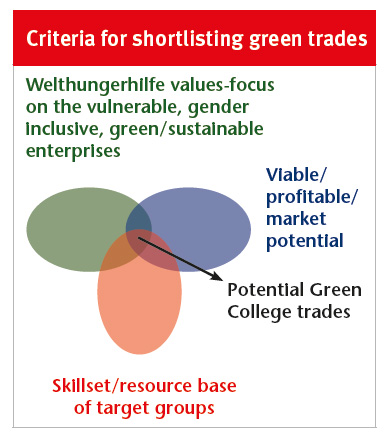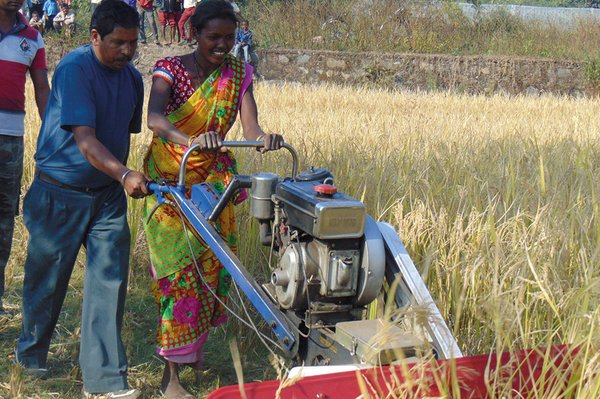 Download this article in magazine layout
Download this article in magazine layout
- Share this article
- Subscribe to our newsletter
Skilling the rural workforce – Green Colleges in India
Over 85 per cent of the rural workforce in India are engaged in the primary (agriculture and allied) sector, which is in crisis. The past decade has seen reductions in the agriculture workforce; for the first time the number of cultivators is lower than that of agriculture labourers, for several reasons related to policy, economic, climatic and socio-cultural factors.
Reversing this disturbing trend requires building farmer institutions, agribusiness enterprises for value chain development, community managed extension of sustainable agriculture, technology upgrading investments in supply chains and policy-level changes. It is estimated that over 173 million rural workers are required to be skilled in agriculture and allied sectors over the next five years. Most of this demand is in short-term vocational training for direct farmer support, and it holds a considerable potential for young people.
Vocational training for food and nutrition security
Aligned with the Skill India Mission (see Box below), and with support from Deutsche Gesellschaft für Internationale Zusammenarbeit (GIZ) and the German Federal Ministry for Economic Cooperation (BMZ), Welthungerhilfe has been working on the Green College programme since 2015. This skill-building programme aims to increase the number and effectiveness of vocational training facilities, training, counselling and professional development in rural areas. The objective is to improve the livelihoods of small farmers, hone up traditional skills and promote entrepreneurship and employment in the green sector to stimulate the rural economy in the long term and reduce distress migration from villages. Eleven Green Colleges across five states are offering well-structured and certified courses in green trades, focusing on a better and more sustainable use of natural resources and reviving skills that were getting lost. The courses are aligned with the Agriculture Skill Council of India (ASCI), a government agency that lays down competency standards and qualifications in line with the National Occupational Standards (NOS).
The major focus of the Green Colleges is to address the skill development opportunities in the farm (agriculture), off-farm (animal husbandry, fisheries etc.) as well as non-timber forest produce (lac, honey, palm jaggery) sectors and several non-farm sub-sectors such as renewable energy, organic and health foods and agro processing. The premise is that the skillset required for training and establishing enterprises in green trades is different from that required for other sectors. Green trades are better and directly aligned with the overall Welthungerhilfe mandate of improving the food and nutrition security of the rural poor.
 Some of the core values of the Green College programme are working with the poor and vulnerable sections of rural society, including differently abled persons, ensuring gender balance and promoting sustainable technologies such as Integrated Farming Systems to reduce the cost of cultivation and the risk of loss. Any course offered by Green Colleges must fulfil basic criteria, as illustrated in the Figure. Currently, the Green Colleges are offering nearly 40 different trades for training rural entrepreneurs, or ‘ecopreneurs’, as they are called under the project.
Some of the core values of the Green College programme are working with the poor and vulnerable sections of rural society, including differently abled persons, ensuring gender balance and promoting sustainable technologies such as Integrated Farming Systems to reduce the cost of cultivation and the risk of loss. Any course offered by Green Colleges must fulfil basic criteria, as illustrated in the Figure. Currently, the Green Colleges are offering nearly 40 different trades for training rural entrepreneurs, or ‘ecopreneurs’, as they are called under the project.
The concept behind the Green Colleges
The word “college” carries a lot of meaning for the community and gives them a feeling of being part of a formal education system. Green colleges have a well-structured course curriculum, and the courses are imparted by well-qualified trainers using participatory learning methods. The training methodology has a good combination of theory and practical modules to impart knowledge, skills and attitudes to the trainees. The trainings are usually followed by an internal/third party evaluation and certification. The Green Colleges also work closely with knowledge institutions such as the Indian Institute of Natural Resins and Gums (IINRG) to provide training on lac cultivation, Krishi Vigyan Kendras to support agriculture-related trainings and the Dairy Development Board for dairy and animal health-worker-related trainings.
Selection, counselling and fees. Short-term trainings (less than one month), medium-duration training (between one and six months) and Farmer Field Schools related to over 40 trades are being offered. Participants are selected through a rigorous counselling process. During counselling, interested youths who are prepared to start enterprises after the training are selected, and the remaining youths are guided to other courses which might suit them better. The selected candidates are charged a nominal fee (up to EUR 43 for a 60-day training) to develop ownership among trainees and for them to expect high quality from the course. In some Green Colleges, the trainings are partly funded by corporates, and the trainees can also obtain government scholarships for certain trainings.
Post-training support. The initiative supports trainees for bank linkage, micro finance or to avail government subsidies for starting or extending their business. The trainees receive regular post-training follow-up support in establishing their enterprises and to tackle initial challenges. The smallholder farmers trained at the Green Colleges are collectivised as Farmer Producer Groups, and Common Facility Centres are set up to provide services like drying, sorting, grinding, packaging, branding and marketing.
Developing the ecosystem. Welthungerhilfe collaborates with the Agriculture Skill Council of India (ASCI) to provide technical support for accreditation and affiliation of the Green Colleges and its courses. Skill Green, an incubator setup by the National Skills Foundation of India (NSFI) in partnership with Welthungerhilfe, provides support to Green Colleges for accreditation/affiliation, government scholarship processes, course curriculum development, training of trainers, fundraising, technical support in the form of developing micro-business plans, value chain studies, etc. Skill Green catalyses the above processes and supports Green Colleges in effectively collaborating with the government skill development ecosystem.
Looking ahead
So far, 7,924 young farmers with an average age of around 30 years (46 per cent of them women and around 65 per cent between 15 and 35 years of age) have been trained. A total of 2,413 farmers have gained incremental income (average annual increment of EUR 336 per trainee). By 2019, the project is expected to benefit around 36,000 smallholder farmers by offering training opportunities through the Green Colleges, and at least 70 per cent of the trainees are likely to increase their annual net income by EUR 240, which is a significant 40 per cent increase over existing incomes of smallholders.
Going ahead, the focus of the programme will be on the sustainability and quality of the Green Colleges through multi-stakeholder engagement and collaborations. The intent is to attain financial sustainability of Green Colleges through income from training fees, government programmes, private donors or corporates. The project aims to scale up courses, extension methods and institutional models of the Green College as part of the Skill India Mission and skill development programmes in other countries.
The Skill India Mission
In 2015, the Indian Government launched the ‘Skill India’ mission with the aim of training over 400 million workers in different skills by 2022. The Ministry of Skill Development & Entrepreneurship (MSDE) is the nodal and implementing agency for the mission. Formed under a unique public private partnership (PPP) model, the National Skill Development Corporation (NSDC) has the mandate to create support systems concentrating on quality assurance, information systems and Train the Trainer academies. Its focus is on 21 sectors through various sector skill councils. The Agriculture Skill Council of India (ASCI), focusing on the agriculture sector, has been promoted by the National Skills Foundation of India (NSFI). The annual budget for skill development for the fiscal year 2017–18 is around EUR 430 million, which is miniscule for a mission of such magnitude to be fulfilled. Financially viable models are required for skill development which generate revenues from training fees, corporate partnerships and donor contributions.
Parthasarathy Thiruvenkadam
Project Coordinator Green Colleges
Deutsche Welthungerhilfe e.V.
Karnataka, India
partha.sarathy(at)welthungerhilfe.de
The author would like to thank Green College Partners and the Welthungerhilfe team for their important inputs and insights.





Add a comment
Be the First to Comment